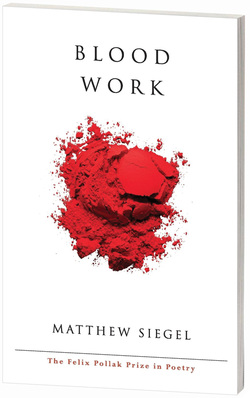|
Blood work happens both inside and outside the body. It is the vital process taking place within each of us, moving air and nutrients to each cell and carrying off waste. Blood work happens externally once someone has pierced you with a needle, extracted a vial of you, and labels it for later testing. Matthew Siegel’s debut exists in the tension between these two spaces. It happens both deep inside and far away from the body.
When the work succeeds, and there are great successes here, it is often in moments where some skin or some line or some barrier is being pierced and crossed. Siegel succeeds when he forces the reader across these boundaries:
The language behind these moments is uttered by a voice that has been poked and prodded, sliced and collected, held under a microscope and analyzed endlessly. It is a voice well aware of hospital gowns, embarrassment, and pointless agony.
There is a second, more tentative, distant, and non-specific voice woven throughout Blood Work. It is a voice awash in pronouns, abstract nouns, and a camera angle shot too far from the subject:
In these moments, when the storytelling feels miles away, the reader can feel the form of the poem trying to compensate, the content trying to escape, and the voice muddled in he's, she's, and I’s. There are no named characters here, no identifiers of persons that could help draw the narrative through the length of the book. There is a clear sense of family, but one is not sure that she always means mother, nor that he always means father (or author, or brother). In fact, the only named character comes to us in the opening poem:
And with this, the reader is handed an implicit promise, that this book you are about to read will not devolve into a personal journal infected with the intrusive I that has run its course in both confessional and post-confessional poetry. This poetry is going to be told from a character point of view that brings the reader safely to the true and the scary, like a puppet a doctor might use to calm a terrified child. Unfortunately, this promise is broken immediately and repeatedly. In the places where the writing does not hold up, this conceit might have redeemed.
Closeness and specificity are Siegel’s strong points. When he is obsessed with a photo, as about half a dozen poems are based on, he highlights every grain, every pixel of the image. Were the images included inline with the poems or links made available in the appendix of the book, it would have served to bring the reader further in. The genius of this book happens when Siegel pulls a moment from earlier in the poem, or earlier in the book, forward into the next section. Like a surgeon stitching up an incision, the reader often flips back through pages from a acupuncture clinic to a bird’s wings pinned down on a table, from a tea bag bleeding to an entire body in hot water. The first and last poems of the book are all impact and bombast. They are powerful bookends to the experience of being in constant pain and of being a constant patient. But the most powerful moment of the book happens about three quarters of the way through, in poem "With My Face Buried in Supermarket Flowers I Spent the Entire Evening." The poem unfolds in tercets and with standard punctuation, a form used only a few times throughout the book. It speaks in a singular voice about a specific experience, saying big, important, unsayable things:
Siegel has created a book of poems that vacillate between biography and memoir. If biography—paraphrasing Vivian Gornick—is using events to illustrate something about your life, and memoir is using your life events to illustrate something important about all of our lives, Siegel succeeds when he tends towards memoir. He succeeds when he is not bounded by tight form, when he is genuine rather than clever, when he shares a moment rather than showing off some poetic technique.
Siegel's voice is pained and scarred, his poetics obsessive and specific—as we all are if we have any age or experience. He highlights the patterns, the pulses, and the impulses of being human, of doing blood work, of dealing with the agony that, in crossing the boundaries from health to disease, from innocence to age, from meat to conscious flesh, eventually touches us all. |
Blood Work. By Matthew Siegel. University of Wisconsin Press, 2015.
|
CURRENT ISSUE
|
CONTACT
|
DEPARTMENT OF ENGLISH
|


